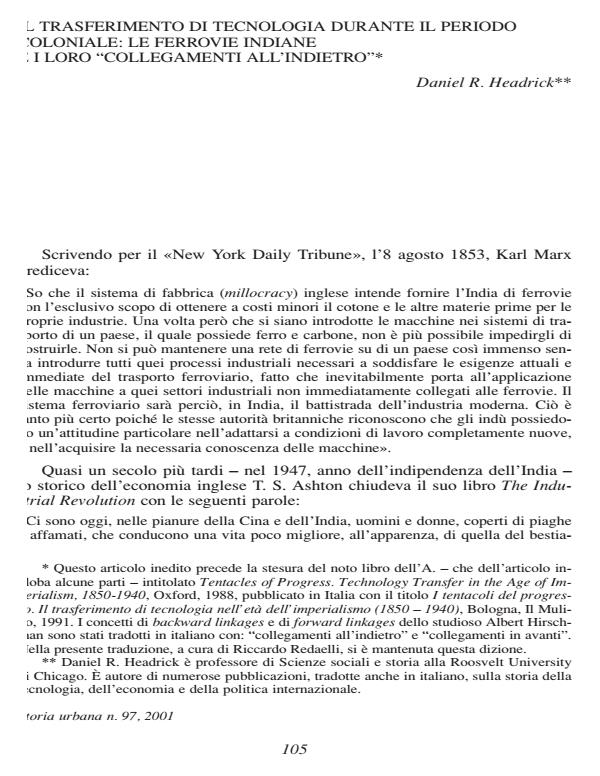Il trasferimento di tecnologia durante il periodo coloniale. Le ferrovie indiane e i loro "collegamenti all'indietro"
Titolo Rivista STORIA URBANA
Autori/Curatori Daniel R. Headrick
Anno di pubblicazione 2003 Fascicolo 2001/97 Lingua Italiano
Numero pagine 21 P. Dimensione file 111 KB
DOI
Il DOI è il codice a barre della proprietà intellettuale: per saperne di più
clicca qui
Qui sotto puoi vedere in anteprima la prima pagina di questo articolo.
Se questo articolo ti interessa, lo puoi acquistare (e scaricare in formato pdf) seguendo le facili indicazioni per acquistare il download credit. Acquista Download Credits per scaricare questo Articolo in formato PDF

FrancoAngeli è membro della Publishers International Linking Association, Inc (PILA)associazione indipendente e non profit per facilitare (attraverso i servizi tecnologici implementati da CrossRef.org) l’accesso degli studiosi ai contenuti digitali nelle pubblicazioni professionali e scientifiche
By the 1940s, India had obtained the fourth longest railway network in the world. Yet its industrialization was delayed until after its independence in 1947 by British colonial policy. Until the 1930s, both the Indian government and the private railway companies hired only European supervisors, engineers, and even technical personnel such as locomotive drivers. The government’s Stores Policy required that bids on railway materiel be presented to the India Office in London, making it almost impossible for enterprises based in India to compete for orders. Likewise, the railway companies purchased most of their materiel in Britain, rather than in India. Although the railway maintenance workshops in India could have manufactured as well as repaired locomotives, the railways imported almost all of them from Britain, and the rest from Germany, Belgium, or the United States. The Tata company built a steel mill in India before World War I, but could not obtain orders for rails until the 1920s and 30s. It was not laissez-faire, but deliberate colonial policies that prevented the natural link-ages between railways and their suppliers. The consequence was to delay the industri-alization of India by half a century.;
Daniel R. Headrick, Il trasferimento di tecnologia durante il periodo coloniale. Le ferrovie indiane e i loro "collegamenti all'indietro" in "STORIA URBANA " 97/2001, pp , DOI: